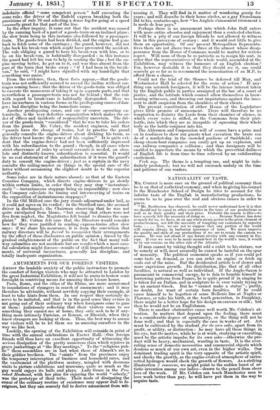NATIONALITY OF TASTE.
COBDEN is more sure on the ground of political economy than he is on that of cesthetical economy, and when in giving his counsel to the Manchester School of Design he tries to account for the inferior taste of the English in manufacturing productions, he seems to us to pass over the real and obvious causes in order to guess.
"Mr. Brotherton has observed, he could never understand how it is that we should not be equal to other countries in the taste of our productions as well as in their quality and their price. Probably the reason is this—we have scarcely felt the necessity of doing so Because Nature has done so much for us, we have, in an age when steam-power is the great element of productiveness, not felt the necessity of tempting our customers by superior taste Now, we are not to suppose that any portion of the world will remain always in barbarian ignorance of taste. We must improve the quality and style of our productions if we are to retain the c4stona we possess. He was not afraid of any future rivalry with any country in Eu- rope. If ever we were to be made second-best in the world's race, it would be by our cousins on the other side of the Atlantic."
If man cannot by taking thought add a cubit to his stature, nor be comely at will, most assuredly he cannot be tasteful on the spur of necessity. The political economist speaks as if you could. get some taste on demand, as you can order an engine or fetch up coals out of the mine. But the desiderated article is of slower and more capricious growth. Its distribution, like that of all other faculties, is natural as well as individual. If the Anglo-Saxon is paramount in commercial energy, he is fain to humble himself in borrowing patterns from France, he is quite proud if in singing he is taken for an Italian, and in sculpture he is ever vainly trying to be an ancient Greek. But he "cannot make a statue " ; partly, no doubt, for want of certain born faculties. If he could cause himself to be begotten of some Hellenic line at Naples or Florence, or take his birth, at the tenth generation, in Dauphiny, there might be a better hope for his design on canvass or silk ; but then he would not be an Englishman.
There is another obstructive cause well worth Mr. Cobden's at- tention. In matters that depend upon the feeling, there must be a considerable degree of spontaneity, or the thing will not be done well ; and that is especially the case in works of art. Art must be cultivated by the student for its own sake' apart from its profit, or utility, or distinction : he may have all those things in his eye, but the motive, while he is at work, studying or executing, must be the artistic impulse for its own sake—otherwise the pro- duct will be heavy, mechanical, wanting in taste. It is the over- ruling sense of domestic necessities and commercial objects which deadens so much of our own art, even in the higher walks. Our dominant trading spirit is the very opposite of the artistic spirit, and checks the growth, as the engine-evolved atmosphere of carbu- rotted hydrogen would check the growth of flowers. As a striking illustration e con verso, we might point to the sudden burst of ar- tistic invention among our ladies--drawn to the pencil from sheer love of the work. If Mr. Cobden can teach Manchester men to love work better than pay, he will have put them in the way to acquire taste.






























 Previous page
Previous page